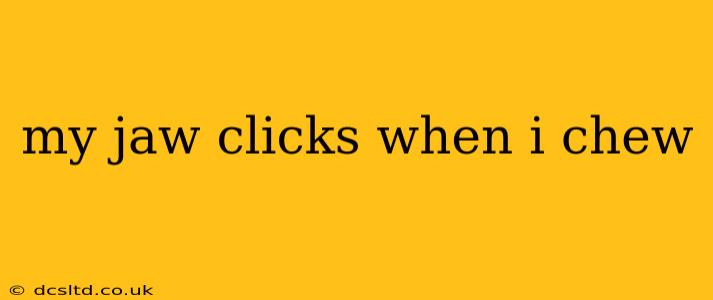My Jaw Clicks When I Chew: Understanding and Addressing Temporomandibular Joint (TMJ) Disorders
Experiencing a clicking jaw while chewing is a common issue, often associated with Temporomandibular Joint (TMJ) disorders. TMJ disorders affect the temporomandibular joints, which connect your jaw to your skull, allowing you to open and close your mouth, chew, and speak. While a clicking jaw isn't always a cause for serious concern, it's crucial to understand the potential causes and when to seek professional help.
What Causes My Jaw to Click When I Chew?
A clicking jaw during chewing is often due to a misalignment or dysfunction within the TMJ. Several factors can contribute to this:
-
Disk Displacement: The TMJ contains a cartilage disk that cushions the joint. If this disk becomes displaced, it can cause clicking, popping, or even locking of the jaw. This is a very common cause of TMJ clicking.
-
Ligament Issues: The ligaments surrounding the TMJ provide stability. If these ligaments are stretched or torn, it can lead to instability and clicking.
-
Arthritis: Osteoarthritis or rheumatoid arthritis can affect the TMJ, causing inflammation, pain, and clicking.
-
Muscle Spasms: Overuse or stress can cause the muscles that control jaw movement to spasm, leading to clicking and pain.
-
Jaw Injury: Previous injuries to the jaw, such as a fracture or dislocation, can cause long-term problems, including clicking.
Why Does My Jaw Click Sometimes and Not Others?
The frequency and intensity of jaw clicking can vary. Sometimes it might only occur occasionally, while other times it could be persistent. This variability depends on several factors, including:
-
Jaw Position: The position of your jaw throughout the day can influence clicking. Prolonged clenching or grinding (bruxism) can worsen symptoms.
-
Activities: Certain activities that involve repetitive jaw movements, like chewing gum excessively or playing certain musical instruments, can trigger or exacerbate clicking.
-
Stress Levels: Stress can lead to increased muscle tension in the jaw, contributing to clicking and pain.
How Can I Stop My Jaw From Clicking?
Fortunately, many cases of TMJ clicking can be managed effectively with conservative treatments. These often include:
-
Over-the-counter pain relievers: Ibuprofen or naproxen can help manage pain and inflammation.
-
Heat or ice packs: Applying heat or ice to the affected area can provide temporary relief.
-
Soft foods: Switching to a soft food diet can reduce stress on the jaw joint.
-
Stress management techniques: Practicing relaxation techniques, such as yoga, meditation, or deep breathing exercises, can help reduce muscle tension.
-
Mouthguards: A custom-fitted mouthguard can prevent nighttime grinding, protecting the TMJ.
When Should I See a Doctor About My Clicking Jaw?
While occasional clicking might not be cause for alarm, you should seek professional help if:
- The clicking is accompanied by significant pain.
- Your jaw locks or becomes difficult to open or close.
- You experience earache, headache, or neck pain.
- The clicking worsens over time.
- Conservative treatments do not provide relief.
A doctor, dentist, or specialist (like an orthodontist or oral surgeon) can diagnose the underlying cause of your clicking jaw and recommend the most appropriate treatment plan. This may include more advanced therapies such as physical therapy, medication, or in rare cases, surgery.
Does Clicking Mean I Have TMJ Disorder?
A clicking jaw is a common symptom of TMJ disorders, but it's not always indicative of a problem. Many people experience occasional clicking without experiencing pain or other symptoms. However, persistent clicking, particularly when accompanied by pain or other symptoms, warrants a professional evaluation to determine the cause and receive appropriate treatment.
What are the Long-Term Effects of Untreated Clicking Jaw?
Ignoring a persistent clicking jaw and associated pain can lead to more severe problems, including chronic pain, limited jaw mobility, and potentially more extensive treatment in the future. Early intervention is usually the best approach to effectively manage TMJ disorders.
Remember, this information is for general knowledge and does not constitute medical advice. If you are experiencing concerning symptoms, it's essential to consult a healthcare professional for proper diagnosis and treatment.
